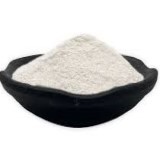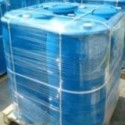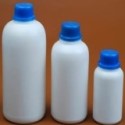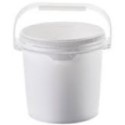 |
Sodium Alginate USP NF FCC Food Grade Supplier Exporter Manufacturers' Representative |
Email: info@ammol.org |
Call Toll Free +1-855-552-6665 |
Sodium Alginate
CAS Number: 9005-38-3
Molecular Formula: (C6H7O6Na)n
Molecular Weight: Varies

Sodium Alginate
Sodium Alginate USP NF Grade Specifications
Alginic acid, sodium salt --- CAS 9005-38-3
Sodium Alginate is the purified carbohydrate product extracted from brown seaweeds by the use of dilute alkali. It consists chiefly of the sodium salt of Alginic Acid, a polyuronic acid composed of -D-mannuronic acid residues linked so that the carboxyl group of each unit is free while the aldehyde group is shielded by a glycosidic linkage. It contains not less than 90.8 percent and not more than 106.0 percent of sodium alginate of average equivalent weight 222.00, calculated on the dried basis.
Identification:
A: To 5 mL of a solution (1 in 100) add 1 mL of calcium chloride: a voluminous, gelatinous precipitate is formed immediately.
B: To 10 mL of a solution (1 in 100) add 1 mL of 4 N sulfuric acid: a heavy, gelatinous precipitate is formed.
Microbial limits: The total bacterial count does not exceed 200 cfu per g, and the tests for Salmonella species and Escherichia coli are negative.
Loss on drying: Dry it at 105 for 4 hours: it loses not more than 15.0% of its weight.
Total ash: Proceed as directed for Total Ash under Methods of Analysis, carefully igniting about 3 g, accurately weighed, in a tared platinum dish, until the residue is thoroughly carbonized (about 5 minutes), and then igniting in a muffle furnace at a temperature of 800 ± 25 until the carbon is completely burned off (approximately 75 minutes): between 18.0% and 27.0% of ash is found, calculated on the dried basis.
Arsenic: 1.5 ppm.
Lead: Add 1.0 g to 20 mL of nitric acid in a 250-mL conical flask, mix, and heat carefully until the Sodium Alginate is dissolved. Continue the heating until the volume is reduced to about 7 mL. Cool rapidly to room temperature, transfer to a 100-mL volumetric flask, and dilute with water to volume. A 50.0-mL portion of this solution contains not more than 5 microgm of lead (corresponding to not more than 0.001% of Pb), 15 mL of ammonium citrate solution, 3 mL of potassium cyanide solution, and 0.5 mL of hydroxylamine hydrochloride solution being used for the test. After the first dithizone extractions, wash the combined chloroform layers with 5 mL of water, discarding the water layer and continuing in the usual manner by extracting with 20 mL of 0.2 N nitric acid.
Heavy metals: Conduct the ignition in a platinum crucible, and use nitric acid in place of sulfuric acid to wet the test specimen: the limit is 0.004%.
Sodium Alginate FCC Food Grade Specifications
Algin
(C6H7O6Na)n Equiv wt, calculated 198.11
Equiv weight, actual (avg.) 222.00
INS: 401 CAS 9005-38-3
DESCRIPTION
Sodium Alginate occurs as a white to yellow-brown, fibrous or granular powder. It is the sodium salt of alginic acid. It dissolves in water to form a viscous, colloidal solution. It is insoluble in alcohol and in hydroalcoholic solutions in which the alcohol content is greater than about 30% by weight. It is insoluble in chloroform, in ether, and in acids having a pH lower than about 3.
Function: Stabilizer; thickener; emulsifier; gelling agent.
REQUIREMENTS
Identification: -
A. Add 1 mL of calcium chloride to 5 mL of a 1:100 aqueous solution. A voluminous, gelatinous precipitate forms.
B. Add 1 mL of 2 N sulfuric acid to 10 mL of a 1:100 aqueous solution. A heavy, gelatinous precipitate forms.
C. Place about 5 mg of sample into a test tube, add 5 mL of water, 1 mL of a freshly prepared 1:100 naphtholresorcinol:ethanol solution, and 5 mL of hydrochloric acid. Heat the mixture to boiling, boil gently for about 3 min, and then cool to about 15C. Transfer the contents of the test tube to a 30-mL separator with the aid of 5 mL of water, and extract with 15 mL of isopropyl ether. Perform a blank determination and make any necessary correction. The isopropyl ether extract from the sample exhibits a deeper purple hue than that from the blank.
Assay: A sample yields not less than 18.0% and not more than 21.0% of carbon dioxide (CO2), corresponding to between 90.8% and 106.0% of Sodium Alginate (equiv wt 222.00).
Arsenic: Not more than 3 mg/kg.
Lead: Not more than 5 mg/kg.
Loss on Drying: Not more than 15.0%.
We also supply Sodium Alginate of BP Ph Eur Grade.
Please visit SDS Safety Data Sheet of Sodium Alginate Suppliers.
American Molecules, also known as ammol.org is a distributor, supplier and manufacturers' representative of all types of Pharmaceuticals, Functional Ingredients, Excipients and Specialty Chemicals in Texas USA. Our principals manufacture supply and export USP NF BP, Ph Eur, etc grades of chemicals pure and reagent grade, mineral fortifiers, FCC food grade. Tailor made particle size and customized specifications are offered. The principal's facility is having one or more of the certifications like FDA approval and GLP, cGMP, ISO9001, ISO14001, ISO/IEC 17025, ISO22000, FSSC 22000, ISO45001, FSSAI, Kosher, HALAL, COPP, WHO-GMP certified and Written Confirmation (WC) for export to Europe is available. The manufacturers suppliers and exporters observe WHO Good Manufacturing Practices and Good Laboratory Practices.





Suppliers and Manufacturers' Representative:

9910 Bent Oak Dr
Houston, TX 77040, USA
Call Toll Free: 1-855-55-AMMOL 1-855-552-6665
Email: info@ammol.org